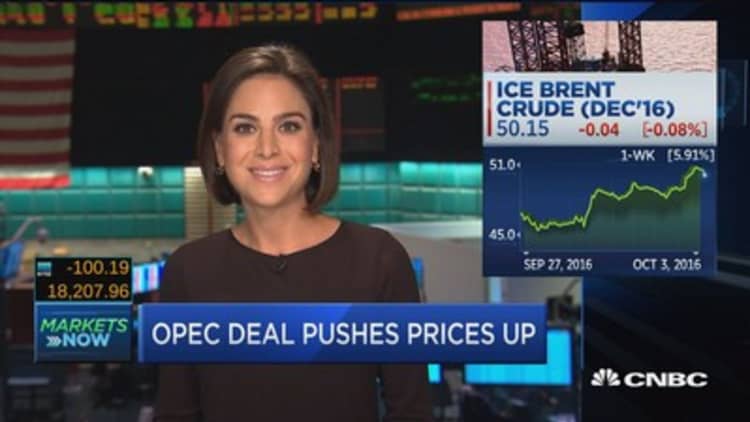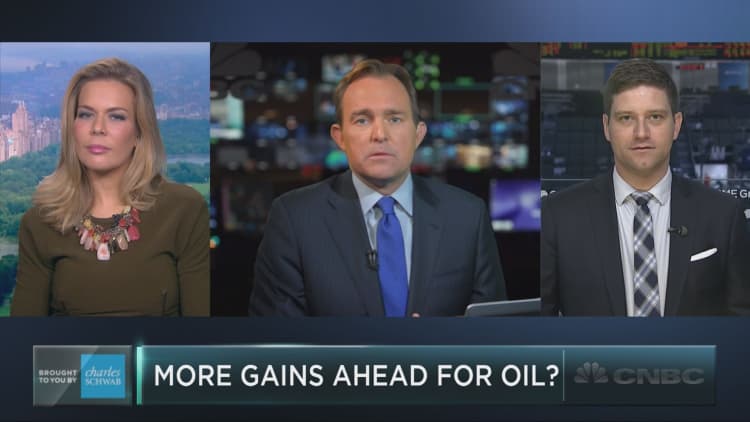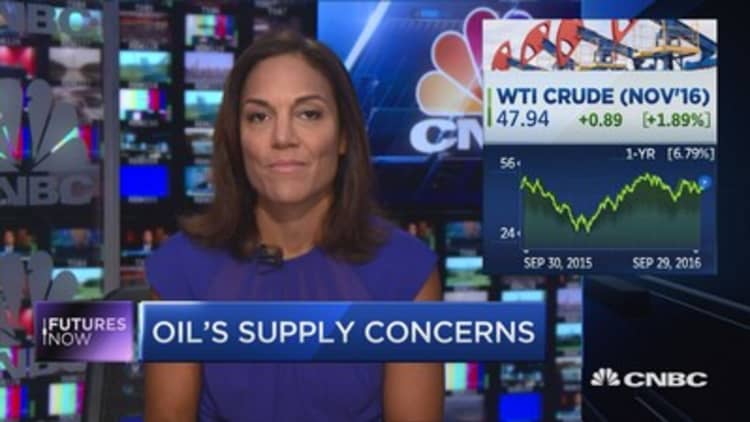
Oil prices were up about 1 percent on Monday after comments by Iran's leader exhorting the need for other oil producers to join OPEC in supporting the market.
Iran's President Hassan Rouhani told his Venezuelan counterpart Nicolás Maduro in a telephone conversation that it was essential for oil producing countries to take a decision to raise the price of oil and stabilize the market, Tehran state news agency IRNA reported.
Rouhani's remarks added to the bullish fervor in the market since last week after the Organization of the Petroleum Exporting Countries announced its first planned output cut in eight years.
December Brent crude futures were last up 62 cents, or 1.2 percent, at $50.81 a barrel by 3 p.m. (1900 GMT), retreating from a six-week high of $50.90.
U.S. West Texas Intermediate (WTI) settled up 57 cents, or 1.2 percent, at $48.81 a barrel. It earlier hit $49.02, its highest since July 5.

Europe and Asia's largest markets, Germany and China, were both shut for public holidays on Monday, limiting trade.
Crude futures were volatile, moving up again by noon in New York toward session highs after drifting most of the morning due to a weaker Wall Street and a dollar.
"It's kind of a light volume day and we're moving from headline to headline, but still Iran telling Venezuela that all countries are going to have to join this production cut is gaining traction because there are many who want to believe this deal will get done," said Phil Flynn, analyst at the Price Futures Group brokerage in Chicago.
"There's already a soft commitment from Russia that it will be part of the OPEC plan and if more non-OPEC members get on board, prices can only go higher."
Oil rallied last week, ending September higher for a second monthly gain in a row, after the Organization of the Petroleum Exporting Countries said it would cut output to between 32.5 million barrels per day (bpd) and 33 million bpd from about 33.5 million bpd, with details to be finalized at its policy meeting in November.
OPEC member Iran, the No. 4 crude exporter, will sign on Tuesday a new petroleum contract that would be cornerstone to raising its crude output to the pre-sanction levels of 4 million bpd.
"Naysayers will undoubtedly fade the headline (of the output cut) and deem the agreement typical OPEC noise, yet at a minimum it means that OPEC has bought themselves a price floor for at least the next two months heading into the November meeting," analysts at RBC Capital Markets said in a note.
Initial skepticism last week over the effectiveness of the deal in eroding the global surplus gave way to a wave of short-covering that drove the price above $50 a barrel for the first time since late August on Monday.

"The lukewarm response to the OPEC deal from analysts (rightfully so) probably attracted some premature selling, with technical traders currently in the driving seat. Oil always runs ahead of itself and this time round is no exception," Saxo Bank manager Ole Hansen said, referring to the price rally.
OPEC's oil output is likely to reach 33.6 million bpd in September from a revised 33.53 million bpd in August, its highest in recent history, a Reuters survey found on Friday.
"Sentiment has been slightly dented by a Reuters survey Friday, showing that despite agreeing to cut production OPEC pumped crude in record amounts through September," said Jeffrey Halley, senior market analyst at brokerage OANDA in Singapore.
Data last week from the U.S. Commodity Futures Trading Commission showed money managers raised their net long holdings of U.S. crude futures in the week to Sept. 27.
Analysts said there was downside risk to oil prices if the planned cut wasn't deep enough to bring production back in line with consumption.
"OPEC has created its own Q4 risk to oil prices ... In raising expectations of a November deal to cut production, it also risks a steep price decline should it fail to achieve its goal of cutting output back to less than 33 million bpd," Barclays said in a note to clients.
Despite that, the bank said it did not expect a repeat of the price crash seen late last year after a rally earlier in 2015, citing an improving Asian economic growth outlook, falling oil supplies and rising investor interest in oil markets as support factors.

